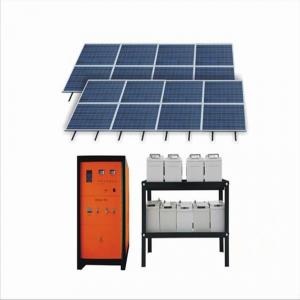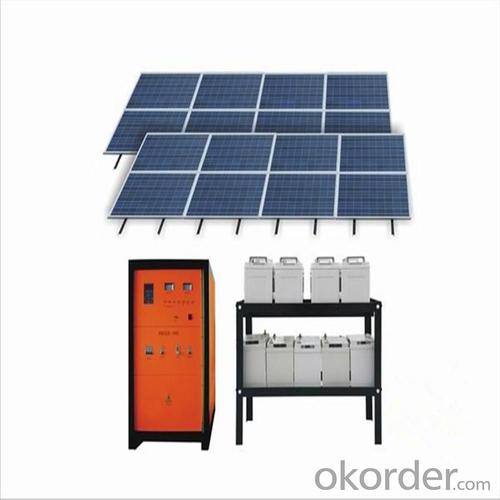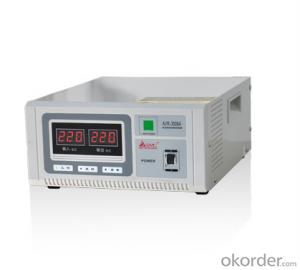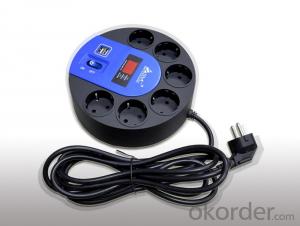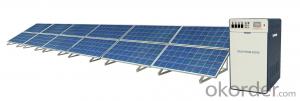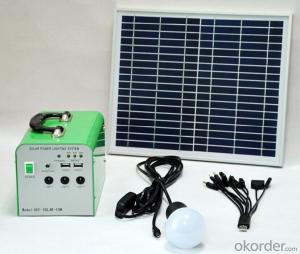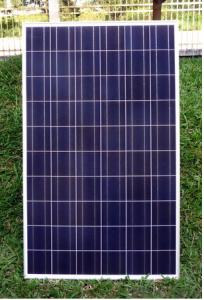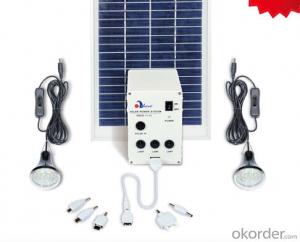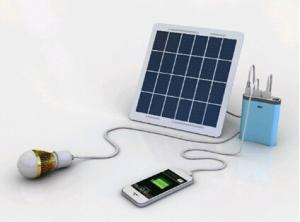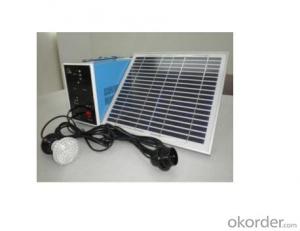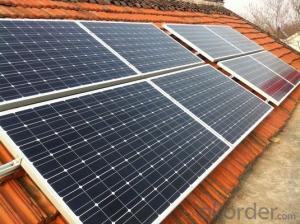Solar Energy Systems Workington - CNBM 150W High Quality Solar Home System
- Loading Port:
- China Main Port
- Payment Terms:
- TT or LC
- Min Order Qty:
- 500 Sets set
- Supply Capability:
- 200000 Sets per year set/month
OKorder Service Pledge
OKorder Financial Service
You Might Also Like
Details Of CNBM 150W Solar Home System High Quality
Item | EW-SHS150W | ||||||
Solar module | Type | Polycrystalline Silicon | |||||
Item/Qty. | SPS075 -12M / 2pcs | ||||||
Maximum power at STC(Pm) | 75 Wp | ||||||
Optimum operating current(Imp) | 21.6V | ||||||
Short circuit current(Imp) | 4.87A | ||||||
Dimensions l×w×h/Weight | 1195mm × 541mm × 28mm / 8kg | ||||||
Battery | Type | Lead-acid Maintenance-free Rechargeable | |||||
System Voltage | 24V | ||||||
Capacity | 100AH/12V, 2pcs | ||||||
Dimensions l×w×h/Weight | 329mm × 172mm × 229mm / 31kg | ||||||
Charge Controller | System Voltage | 24V | |||||
Max. module input short circuit current | 6A | ||||||
Dimensions l×w×h/Weight | 130mm × 88mm × 39mm / 0.165kg | ||||||
Inverter | Type | High frequency pure sine wave | |||||
Item/Qty. | SK300-224 | ||||||
Continuous Output Power | 300W | ||||||
Surge Rating | 600W | ||||||
Output Voltage | 220V / 50Hz | ||||||
Protection | Overload, Short circuit, Reverse polarity(FUSE) , Over/under input voltage, Over temperature. | ||||||
Dimensions l×w×h/Weight | 224mm × 164mm × 78mm / 1.8kg | ||||||
Control Box | Material | Steel box of zinc-plated and lacquer-coated | |||||
Color | Gray | ||||||
Dimensions l×w×h/Weight | 560mm × 550mm × 600mm / 23kg | ||||||
Capacity of Load: | Load | specification | Load power | number | Working hours/day | Expend/day | |
Saving light | 11W | 1 | 6 | 66Wh | |||
Television | 21inch | 70W | 1 | 2 | 140Wh | ||
Television receiver | 25W | 1 | 4 | 100Wh | |||
Total | 106W | 306Wh | |||||
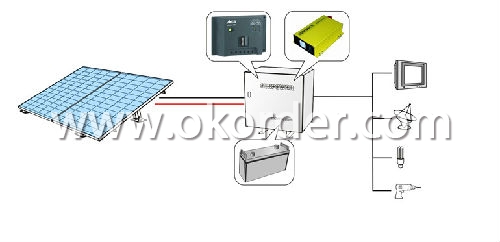
Packaging & Delivery Of CNBM 150W Solar Home System High Quality
Packaging & Delivery Of CNBM 150W Solar Home System High Quality | |
Packaging Detai | Packaging Detail:Export Carton and Pallet or under customer request. |
Delivery Detail:10-20days | |
Our advantages
•Professional products,brand power,group advantage.
•We can do OEM and ODM, and we have our own talented R&D teams
•All our products are easy to be used and convenient in maintanence
•Strong technical team is ready to work for you.
•Factory with 70000square meters,real factory price,top service.
- Q: Can solar energy systems be used in powering agricultural processing facilities?
- Yes, solar energy systems can be used to power agricultural processing facilities. Solar energy systems, such as photovoltaic (PV) panels, can generate electricity from sunlight, which can then be used to power various electrical equipment and processes in agricultural processing facilities. This can include powering machinery used for cleaning, sorting, and packaging agricultural products, as well as running heating, ventilation, and air conditioning systems. Solar energy systems can also be integrated with battery storage solutions to provide a reliable and continuous power supply, even during periods of low sunlight or at night. Additionally, using solar energy to power agricultural processing facilities can help reduce reliance on fossil fuels, lower greenhouse gas emissions, and contribute to a more sustainable and environmentally friendly operation.
- Q: What is the role of inverters in a solar energy system?
- The role of inverters in a solar energy system is to convert the direct current (DC) electricity produced by solar panels into alternating current (AC) electricity that can be used to power common household appliances and be fed into the electrical grid.
- Q: Can solar energy systems be used to power large industrial facilities?
- Yes, solar energy systems can be used to power large industrial facilities. With advancements in technology, solar power systems have become increasingly efficient and cost-effective, making them viable options for industrial-scale energy needs. Many industrial facilities are now adopting solar energy systems to reduce their reliance on traditional fossil fuel-based power sources and to lower their carbon footprint. These systems can be customized to meet the specific energy demands of large-scale industrial operations, providing a sustainable and reliable source of power.
- Q: How do I choose the right size of solar energy system for my home?
- To choose the right size of solar energy system for your home, you should consider your average electricity consumption, available roof space, and budget. Start by evaluating your monthly energy usage and determine the amount of electricity you want to generate through solar. Then, consider the size and direction of your roof to estimate how many solar panels can fit and receive maximum sunlight. Lastly, take into account your budget and financial goals to determine the size that aligns with your investment plans. Consulting with a reputable solar installer can also provide valuable insights and help you make an informed decision.
- Q: What are the components of the solar photovoltaic system?
- TPT: on the back of the solar battery cover of fluorine plastic film is white, the sun has reflection function, so the efficiency of components increased slightly, and because of its high infrared emissivity, can reduce the working temperature of the component, but also conducive to improve the efficiency of the component. Of course, the fluorine plastic film with the first solar cell packaging materials required for aging, corrosion resistance, air permeability and other basic requirements.
- Q: Are there any disadvantages to installing a solar energy system?
- Yes, there are a few disadvantages to installing a solar energy system. Some of the main drawbacks include the high upfront cost of installation, the need for sufficient sunlight to generate optimal power, and the requirement for ample space to accommodate the solar panels. Additionally, solar energy systems can be less efficient during cloudy or rainy periods, and their production may not align with peak energy demands. Finally, the maintenance and occasional replacement of components can be costly and time-consuming. Despite these disadvantages, the long-term benefits and environmental advantages of solar energy make it an increasingly popular and viable option for many households and businesses.
- Q: Can solar energy be used for hot water?
- Yes, solar energy can be used for hot water. Solar water heating systems utilize the sun's energy to heat water through solar thermal collectors, reducing the reliance on traditional energy sources and lowering energy costs.
- Q: Are there any fire safety concerns associated with solar energy systems?
- Yes, there are fire safety concerns associated with solar energy systems. While solar energy systems are generally considered safe and reliable, there have been instances where these systems have caused fires. One potential fire safety concern is related to faulty installation or maintenance of the solar panels. If the panels are not properly installed, there is a risk of electrical faults or short circuits, which can lead to overheating and potentially cause a fire. Similarly, if the system is not regularly inspected and maintained, it can increase the risk of electrical failures and subsequent fires. Another concern is related to the electrical wiring and connections of the solar energy system. Faulty wiring or loose connections can generate heat and may result in electrical fires. This is particularly relevant in older systems where wiring may have deteriorated over time. Moreover, during a fire incident, firefighters may face additional challenges when dealing with buildings equipped with solar energy systems. The presence of live electricity generated by the panels can pose a risk to firefighters, making it more difficult to safely extinguish the fire. To mitigate these fire safety concerns, it is crucial to ensure that solar energy systems are installed by qualified professionals following the necessary codes and regulations. Regular inspections and maintenance should also be conducted to identify and address any potential issues promptly. Additionally, it is important for firefighters to receive proper training on how to handle fires involving solar energy systems to minimize risks.
- Q: How do solar energy systems impact the energy consumption of buildings?
- Buildings' energy consumption is significantly impacted by solar energy systems. These systems harness the sun's power to generate clean and renewable electricity, which can offset the need for grid-based energy. One of the main ways solar energy systems affect energy consumption is by decreasing reliance on non-renewable sources like fossil fuels. Coal, oil, and natural gas, which are traditional energy sources, contribute to greenhouse gas emissions and global warming. Conversely, solar power produces electricity without emitting any harmful substances, making it an environmentally friendly alternative. Additionally, solar systems help reduce a building's overall energy demand. By generating electricity on-site, buildings can decrease their dependence on the electrical grid. This not only lessens the strain on the grid but also lowers the risk of power outages during periods of peak demand or natural disasters. Moreover, solar energy systems can lead to financial savings for building owners. When solar panels generate electricity, the building consumes less power from the grid, resulting in reduced utility bills. In some cases, surplus energy generated by the solar system can be sent back to the grid, allowing building owners to earn credits or even receive payments from utility companies through net metering programs. Furthermore, solar energy systems offer long-term benefits for buildings. Solar panels have a lifespan of approximately 25 to 30 years, and their maintenance costs are relatively low compared to other energy systems. This implies that once the initial investment is recovered, the building can enjoy years of clean and affordable energy. To conclude, solar energy systems positively impact buildings' energy consumption by reducing reliance on non-renewable sources, lowering overall energy demand, providing financial savings, and offering long-term sustainability.
- Q: What is the role of solar energy systems in promoting sustainability?
- Solar energy systems play a crucial role in promoting sustainability by providing a clean, renewable, and abundant source of energy. Unlike fossil fuels, which emit harmful greenhouse gases and contribute to climate change, solar energy systems generate power without producing any pollution or emissions. This not only helps to mitigate the negative impacts of climate change but also reduces the dependence on finite fossil fuel resources, which are rapidly depleting. Solar energy systems also contribute to sustainability by decentralizing energy production. Traditional energy sources, such as coal-fired power plants, are typically large-scale and located far away from the end-users. This results in significant energy losses during transmission and distribution. In contrast, solar energy systems can be installed on rooftops or in close proximity to where the energy is needed, reducing energy losses and improving overall efficiency. Additionally, solar energy systems enable individuals and communities to become more self-sufficient and less reliant on centralized energy grids. By producing their own electricity, households and businesses can reduce their energy bills and have a more stable and reliable energy supply, especially in remote areas or during power outages. This decentralization also helps to enhance energy security and resilience, as it reduces the vulnerability to disruptions caused by natural disasters, cyber-attacks, or other emergencies. Furthermore, solar energy systems have a long lifespan and require minimal maintenance, resulting in lower operational costs compared to conventional power generation technologies. This makes solar power an economically viable option, particularly over the long term. As the cost of solar panels and related technologies continues to decline, more individuals, businesses, and governments are investing in solar energy systems, driving further adoption and creating a positive feedback loop for sustainability. The role of solar energy systems in promoting sustainability extends beyond the environmental and economic benefits. Solar power can also have social implications by providing access to electricity for communities that are currently underserved or lack reliable energy sources. This can improve the quality of life, support economic development, and enable educational opportunities, especially in developing countries. In summary, solar energy systems play an integral role in promoting sustainability by reducing greenhouse gas emissions, improving energy efficiency, enhancing energy security, and fostering economic development. By harnessing the power of the sun, we can create a more sustainable future for generations to come.
Send your message to us
Solar Energy Systems Workington - CNBM 150W High Quality Solar Home System
- Loading Port:
- China Main Port
- Payment Terms:
- TT or LC
- Min Order Qty:
- 500 Sets set
- Supply Capability:
- 200000 Sets per year set/month
OKorder Service Pledge
OKorder Financial Service
Similar products
Hot products
Hot Searches
Related keywords
